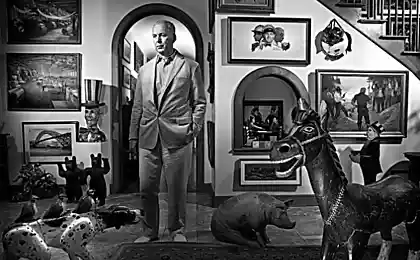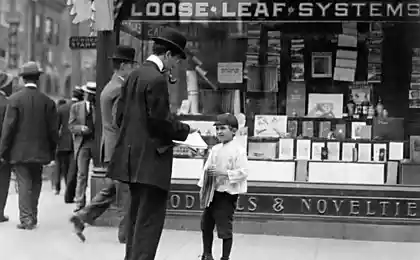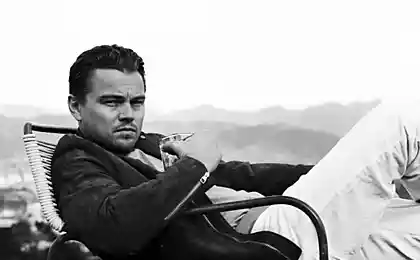422
Monkey again beat wall street
No, it's not about the Project Washoe (Washoe), which we recently discussed, it is a little about another. Of course, I imagine that all it is, but still
Experiment with the "monkey investors", in which simple monkeys beat the guru of wall street in the stock market, became a byword.
A few years ago a study conducted on behalf of Cambridge University, have shown that, historically, the perfect balance in the portfolio long-term investor was reached in the case, if 80% was invested in stocks and 20% in cash (or equivalents, such as Treasury bonds). At the same time to reallocate the portfolio process once per year.
And it turned out that if 20% of the money put on Deposit in the Bank, and the other 80% of the distribution on the shares that are picked monkeys, you can earn quite a lot.
By the end of 2014, according to data Hedge Fund Research Inc., the average hedge Fund lost 0.6%, while the "portfolio monkey" showed an increase of 2.3%. A year earlier, the hedge funds showed a yield of 6.7%, while monkeys and a Bank account earned 21%, was three times more efficient!
In 2012 the monkey four times surpassed the hedge funds, earned 13% compared to 3.5% of the funds. MarketWatch columnist Brett Arends finds that such a result should not be surprising.
"To run a big hedge Fund is very expensive: you must pay wages, bonuses and so on (imagine how much you have to pay for insurance, given the statistics on heart attacks among traders). And all the expenses investors pay out of pocket. Then the question arises: why do we need hedge funds, if the random stock selection gives the best results?" notes Arends.
"In other words, managers must beat the market by approximately 60%. Annually. One can only wish them luck, as in reality it is almost impossible," writes Arends.
In his view, investors should run away from hedge funds, but, according to The Wall Street Journal, investors instead just arrive. Around the world in hedge funds invested about $2.5 trillion.
"Wall street is the only place on earth where lambs are asked to turn them into shish kebab, and turkeys can hear the applause on thanksgiving Day," summarizes Arends.
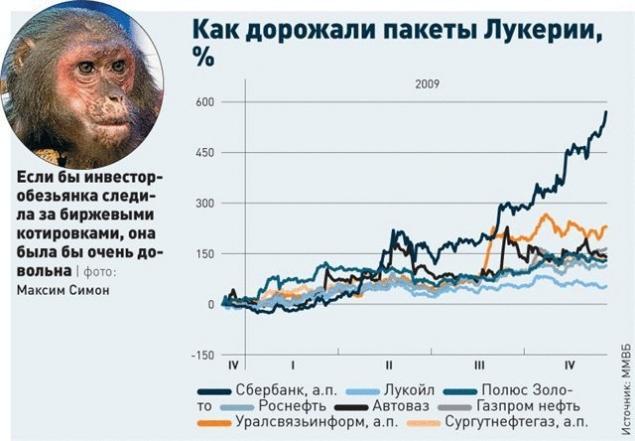
In early 2009, the Russian magazine "Finans" has started an experiment. Before the circus monkey put Lukeria 30 cubes with the names of the companies placing shares on the stock exchange. She chose 8 cubes, and of these shares was formed investment portfolio.
The experiment led to a striking result: investment portfolio, assembled by Luceria, for the year rose much stronger than the units of most famous foundations.
Lucario were able to get around only 18 of 312 equity Funds, mixed investments and funds of funds. Portfolio circus monkey for the year showed a higher return than investments 94% of Russian collective control.
Of course, the results of an unusual experiment can be treated with humor. Perhaps if among themselves competed 312 monkeys, then their performance would disperse even more than of return of many mutual Funds. It is obvious that Lucario incredibly lucky with "pregame" of Sberbank, which alone in its portfolio has demonstrated an extraordinary growth, and the remaining components rose in General, within reason.
Interestingly, in 2010 Luceria was again assessed high dividends, which amounted to more than 12% of the originally invested funds. No matter how much I joke about lucky the investor from primates, we have to admit that just holding a random action, not offering them any deals in a long time, Lukeria beat the absolute majority of Russian professional managers. Two years 86% of equity funds have earned less than a regular circus monkey.
And some more on the same topic:
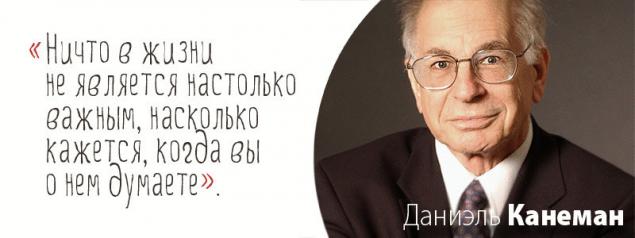
Economic guru forecasts worse than a random selection
Nobel laureate Daniel Kahneman smashed to smithereens the predictions of the so-called experts and the financial advisors and investors-lovers in his book "Thinking fast and slow" (Thinking, Fast And Slow).
Kahneman came to the conclusion that people are especially prone to the "illusion of skill" when you're small experience gives them extreme self-confidence. As a result, they make aggressive predictions and refuse to accept new information.
As Kahneman describes, a bad reputation of experts is substantiated by the psychologist Philip Tetlock. He interviewed 284 people who made a living "comments or advice on political and economic trends." Tetlock asked them to estimate the probability that a particular event will occur in the near future in familiar and unfamiliar to them areas and regions.
Respondents were asked to rate the probability of three alternative outcomes of political and economic events: the preservation of the status quo and change in the big or smaller party.
The results were devastating. Experts have shown themselves worse than if they had simply assigned equal opportunity for each of the three possible outcomes. In other words, people who earn their living, studying a particular topic, and make predictions worse than a monkey who randomly make a choice among the possible options. Even in the regions of its specialization, the experts performed better than non-specialists.
The experts proved to be worse than a random distribution, estimating the probability of an event. In addition, Tetlock found that the famous "forecaster", the more likely his overconfidence and error.
In fact, experts seldom recognize errors, often the wording is:"made a mistake just in time" or "almost right".published
P. S. And remember, only by changing their consumption — together we change the world! ©
Source: masterok.livejournal.com/
Experiment with the "monkey investors", in which simple monkeys beat the guru of wall street in the stock market, became a byword.
A few years ago a study conducted on behalf of Cambridge University, have shown that, historically, the perfect balance in the portfolio long-term investor was reached in the case, if 80% was invested in stocks and 20% in cash (or equivalents, such as Treasury bonds). At the same time to reallocate the portfolio process once per year.
And it turned out that if 20% of the money put on Deposit in the Bank, and the other 80% of the distribution on the shares that are picked monkeys, you can earn quite a lot.
By the end of 2014, according to data Hedge Fund Research Inc., the average hedge Fund lost 0.6%, while the "portfolio monkey" showed an increase of 2.3%. A year earlier, the hedge funds showed a yield of 6.7%, while monkeys and a Bank account earned 21%, was three times more efficient!
In 2012 the monkey four times surpassed the hedge funds, earned 13% compared to 3.5% of the funds. MarketWatch columnist Brett Arends finds that such a result should not be surprising.
"To run a big hedge Fund is very expensive: you must pay wages, bonuses and so on (imagine how much you have to pay for insurance, given the statistics on heart attacks among traders). And all the expenses investors pay out of pocket. Then the question arises: why do we need hedge funds, if the random stock selection gives the best results?" notes Arends.
"In other words, managers must beat the market by approximately 60%. Annually. One can only wish them luck, as in reality it is almost impossible," writes Arends.
In his view, investors should run away from hedge funds, but, according to The Wall Street Journal, investors instead just arrive. Around the world in hedge funds invested about $2.5 trillion.
"Wall street is the only place on earth where lambs are asked to turn them into shish kebab, and turkeys can hear the applause on thanksgiving Day," summarizes Arends.

In early 2009, the Russian magazine "Finans" has started an experiment. Before the circus monkey put Lukeria 30 cubes with the names of the companies placing shares on the stock exchange. She chose 8 cubes, and of these shares was formed investment portfolio.
The experiment led to a striking result: investment portfolio, assembled by Luceria, for the year rose much stronger than the units of most famous foundations.
Lucario were able to get around only 18 of 312 equity Funds, mixed investments and funds of funds. Portfolio circus monkey for the year showed a higher return than investments 94% of Russian collective control.
Of course, the results of an unusual experiment can be treated with humor. Perhaps if among themselves competed 312 monkeys, then their performance would disperse even more than of return of many mutual Funds. It is obvious that Lucario incredibly lucky with "pregame" of Sberbank, which alone in its portfolio has demonstrated an extraordinary growth, and the remaining components rose in General, within reason.
Interestingly, in 2010 Luceria was again assessed high dividends, which amounted to more than 12% of the originally invested funds. No matter how much I joke about lucky the investor from primates, we have to admit that just holding a random action, not offering them any deals in a long time, Lukeria beat the absolute majority of Russian professional managers. Two years 86% of equity funds have earned less than a regular circus monkey.
And some more on the same topic:

Economic guru forecasts worse than a random selection
Nobel laureate Daniel Kahneman smashed to smithereens the predictions of the so-called experts and the financial advisors and investors-lovers in his book "Thinking fast and slow" (Thinking, Fast And Slow).
Kahneman came to the conclusion that people are especially prone to the "illusion of skill" when you're small experience gives them extreme self-confidence. As a result, they make aggressive predictions and refuse to accept new information.
As Kahneman describes, a bad reputation of experts is substantiated by the psychologist Philip Tetlock. He interviewed 284 people who made a living "comments or advice on political and economic trends." Tetlock asked them to estimate the probability that a particular event will occur in the near future in familiar and unfamiliar to them areas and regions.
Respondents were asked to rate the probability of three alternative outcomes of political and economic events: the preservation of the status quo and change in the big or smaller party.
The results were devastating. Experts have shown themselves worse than if they had simply assigned equal opportunity for each of the three possible outcomes. In other words, people who earn their living, studying a particular topic, and make predictions worse than a monkey who randomly make a choice among the possible options. Even in the regions of its specialization, the experts performed better than non-specialists.
The experts proved to be worse than a random distribution, estimating the probability of an event. In addition, Tetlock found that the famous "forecaster", the more likely his overconfidence and error.
In fact, experts seldom recognize errors, often the wording is:"made a mistake just in time" or "almost right".published
P. S. And remember, only by changing their consumption — together we change the world! ©
Source: masterok.livejournal.com/
